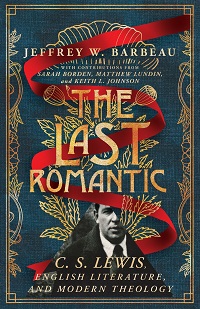 The Last Romantic: C.S. Lewis, English Literature, and Modern Theology, by Jeffrey Barbeau, Professor of Theology at Wheaton College.
The Last Romantic: C.S. Lewis, English Literature, and Modern Theology, by Jeffrey Barbeau, Professor of Theology at Wheaton College.
Many readers have heard C.S. Lewis's logical arguments for the Christian faith. Yet throughout his wide-ranging study and writing, Lewis often began with experience, intuition, and religious feeling rather than dogmatic assertions. The most profound questions of Lewis's own life, argues theologian and literary critic Jeffrey Barbeau, can be seen in his quest to understand the relationship between personal experience and the truth about the world around him.
In a series of three essays, Barbeau explores the influence of nineteenth-century Romanticism on the writings of C.S. Lewis. Barbeau demonstrates Lewis's indebtedness to Romantic notions of imagination and subjectivity, opens new contexts for understanding ideas about memory and personal identity in his autobiographical writings, and explores beliefs about nature and Christian sacraments throughout his writings on Christian faith. This theological and literary investigation reveals Lewis as a profoundly modern thinker and illuminates his ongoing relevance to contemporary debates about theology and culture.
Drawing on extensive reading of the marginalia in the personal library of C.S. Lewis held by the Marion E. Wade Center, Barbeau offers a fresh understanding of the influence of modern theology and Romantic poetry, especially Wordsworth and Coleridge, on many of Lewis's most beloved works. Essays and responses include:
- C.S. Lewis and the "Romantic Heresy," with response from professor Sarah Borden,
- C.S. Lewis and the Anxiety of Memory, with response from professor Matthew Lundin, and
- C.S. Lewis and the Sacramental Imagination, with response from professor Keith L. Johnson.
The Last Romantic is part of the Hansen Lectureship series which offers accessible and insightful reflections by Wheaton College faculty members based upon the transformative work of the Wade Center authors. The Wade Center is grateful for our partnership with IVP Academic and the many ways that the Hansen series broadens the scope of the conversation about these authors and their work.
The Last Romantic will be available for purchase at the Wade Center and online from IVP Academic in January 2025.
Praise for The Last Romantic:
"This beautifully crafted book sets the religious writings of Lewis within the context of German idealism and English Romanticism. Barbeau brilliantly draws upon the marginalia in books from Lewis's own library to place him within the tradition of Methodism, the poetry of Wordsworth and Coleridge, and the philosophy of Schleiermacher, Hegel, and Feuerbach. In the construction of theological language, Lewis is revealed afresh as a deeply learned, sensitive, and serious Christian thinker."
- David Jasper, honorary professional research fellow for the School of Critical Studies at the University of Glasgow
"Jeffrey W. Barbeau's eloquent and accessible lectures look past the blinding assumptions of standard intellectual history to discover a modern C.S. Lewis inspired by religious Romanticism—a vital, creative tradition of poetry and thought that unites the subjective and objective, the personal and the divine. Lewis's place in this visionary company was there all along, expressed in his stories, essays, self-representations, and previously unpublished marginalia. Thanks to Barbeau, we may also see that Lewis, like Elijah on Horeb, was not alone as the last inspiring, faithful Romantic."
- Michael Tomko, professor of humanities at Villanova University and author of Beyond the Willing Suspension of Disbelief: Poetic Faith from Coleridge to Tolkien
"The Last Romantic—a bold claim about Lewis, yet one that Barbeau fully supports with fascinating detail—offers not only the best guide to Lewis's engagement with the Romantics, it is also a wonderful study of Lewis's thought and faith in general, as well as a wise meditation on connections between modern theology and the Romantic imagination. Enter this wardrobe and you will not come out the same."
- James Engell, Gurney Research Professor of English Literature at Harvard University
"As a scholar, Professor Barbeau does not disappoint. He has done remarkable research teasing out the degree to which C.S. Lewis was affected by the English Romantics, which he says was pervasive and primary. His style is winsome and engaging. Did he make the case? Let the reader decide. I must say, I enjoyed the book and discovered some things I had not seen before. It is a good read!"
- Jerry Root, author of Splendour in the Dark: C.S. Lewis's Dymer in His Life and Work and professor emeritus at Wheaton College
-
Connect with the Wade Center
-
By Mail:
Marion E. Wade Center, Wheaton College, 501 College Ave., Wheaton, IL 60187
See "Plan Your Visit" page for street address -
630.752.5908
wade@wheaton.edu - Instagram Facebook Youtube
